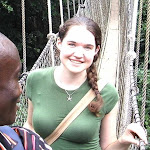Before anything further is said, I must admit one thing: while, patriotically bound as I am, I was sad to see the US bid farewell to South Africa, I cannot help but be happy the Black Stars pulled off that last goal in extra time. I tell you what, nothing beats being in the busiest part of Accra when the Ghanaian team makes it to the World Cup quarter finals; “epic” does not even begin to describe it.
Every television in Ghana seemed to have been moved outside, now surrounded by a crowd of eager fans donned in red, yellow, and green, some with the Ghanaian flag draped over them like a cloak. When the final whistle blew, it was total insanity. Crowds – no, mobs – ran circles through the main station of Accra, waving flags, blowing vuvuzelas, and shouting and singing at the top of their lungs. Traffic was even worse than usual – which is saying something – as the roads were filled with people of all ages literally dancing in the streets. People who spend their every waking moment hawking on the streets or selling fried plantain by kerosene lamps and candles had something to celebrate, and celebrate they did. They had something to smile about; all of Africa had something to smile about. Frankly, they didn’t just want it more than we did – they needed it more than we did. And I couldn’t stop smiling.

Just for posterity- the bus station in Cape Coast, where we watched the first ten minutes or so before climbing into another death trap of a van.
That said, I was not able to actually watch the game past the first goal, as I was sitting in a death trap of a van with my co-worker, Franklin, as we made the trip back to Accra from our day’s outing in Cape Coast, a few hours west of the home base. Franklin being a Cape Coast native, we navigated our way around quite comfortably (well, not always literally, as tro-tros are meant to transport as many people as will fit in the van, not comfort them), making it back to our respective homes just after midnight. Sites on the agenda: Kakum National Park and Cape Coast Castle, a colonial fort and former slave hold.
As previously implied, the transportation involved was pretty much nightmare-ish, but I wouldn’t hesitate to relive it if it meant a return trip to Kakum. The height and general state of the canopy walk is apparently a source of fear from many… for those distracted by the sheer beauty of the park and a group of talkative university students from Accra, however, the only downside was the inability to capture it all in mere photos.



Opting out of joining me on the hike and the canopy walk, Franklin hung around the park entrance as I began the trek up the mountain, ultimately finding myself amidst a large group of university students from Accra. It’s already been widely noted that non-Ghanaians are somewhat of a rarity, particularly if that non-Ghanaian is a single young white woman such as myself; bring on the intrigue.
One of the girls stepped up and asked to take a picture with me, and, when they found me unopposed, I soon found myself a very popular figure, both for pictures and for questioning (mind you, this was the afternoon of Saturday’s Ghana-US game). Though English is an official language in Ghana, it is such only as a bridge between the various, more common, vernaculars, most common being Twi. This somewhat pseudo status of English, then, often makes a translator a helpful factor, and one of the older students quickly designated himself just that…. with the gradually added titles of occasional photographer, escort, and apparently fancying himself my protector of sorts.
Truth be told, he was one of the three fellows in the group bold enough to verbalize any romantic advances, but major props to him for being the most sound-minded of them all. Bachelor 1 declared love shortly after spotting me; bachelor 2 proclaimed me “very beautiful” and asked for my phone number, ironically enough through my translator, bachelor 3, who stuck with me throughout the trip to engage in friendly small talk, question what brought me to Ghana and how long I’d be in the country, fend off teasing from others in the group (who had noted his rather focused attention to the obroni), and ultimately ask if I could love a black man.
The declarations of love, compliments, and various other matters of flirtation are not new; on the contrary, they’ve been freakishly common factors of my time here [while I’m fairly positive it is solely thanks to my semi-reflective skin tone, Kofi and Franklin have chivalrously insisted that they’ve compared and contrasted Ghanaian reactions to myself and to other “obronis,” and for whatever reason I attract the most interest and attention]…. But I digress. Somewhat.
This new question posed by my self-designated translator highlights what had recently become a common topic of conversation, forming another branch of the race factor that has been discussed in previous blogs: inter-racial relationships. If it weren’t for my fear of boring/babbling you to death, I’d be terribly inclined to continue the discussion here, as it’s been so well-covered of late in my current corner of the world, but it is probably for the best that we set it aside for the moment.
Instead, we’ll transition with this: as previously noted, race continues to be a very blatant factor here (and in most places), but more so, unfortunately, as an obvious remnant of colonialism. The rarity of my white skin not only sets me apart, but sets me above, in the traditional Ghanaian mindset, regardless of my repeated protestations. True, obronis are rare. Honestly, we’re even surprised to see one another, wondering what everyone else is – namely, “What on earth are you doing here?” Case in point: I found myself the second obroni on a particularly packed trotro on Saturday, and the young man reached over to tap me on the shoulder, saying “Hello, my white sister! Where are you from?” in a friendly British accent. It’s a tearing sort of experience; while people seem drawn to one another in such ways, it also seemed to encourage the mentality of separation and differentiation. A mentality which, at one time, resulted in the likes of the former slave hold we visited next.
Cape Coast, the former capital of Ghana, was thus also a stronghold during the colonial times of “the Gold Coast,” and a chief port for the transportation of goods, resources unceremoniously stolen from the rich African lands, and, miserably, captured Africans turned slaves. As I cannot do the matter justice, I will not try. Instead, I’ll leave you to Huxley’s Roots, your own reflections, and a few photos, internet allowing. Down side: Franklin and I arrived after the castle had closed, meaning we nearly couldn’t get in and we lacked a guide. Up side: the fact that it was both deserted and getting a bit dark made the experience all the more heartfelt, I think, and silent but for the sound of the ocean just over the fortress wall.







No comments:
Post a Comment